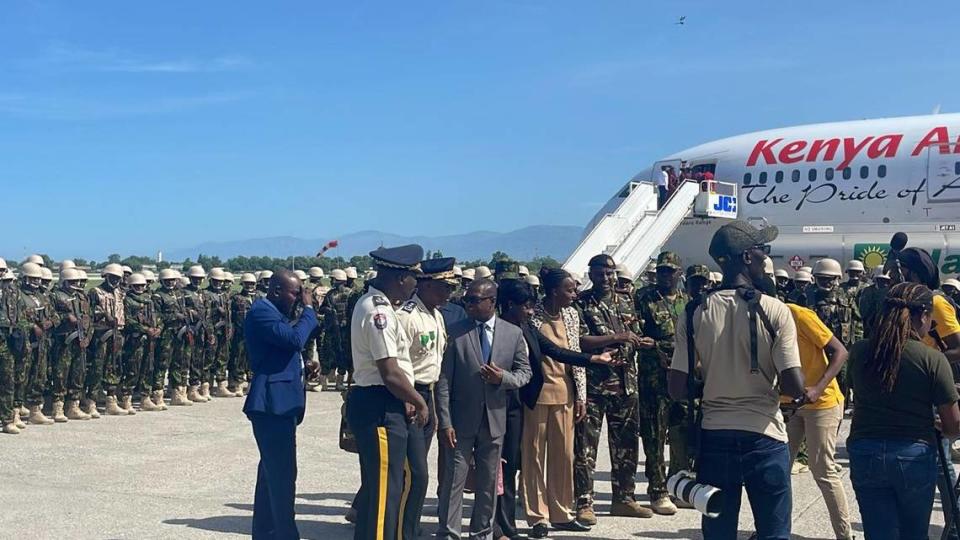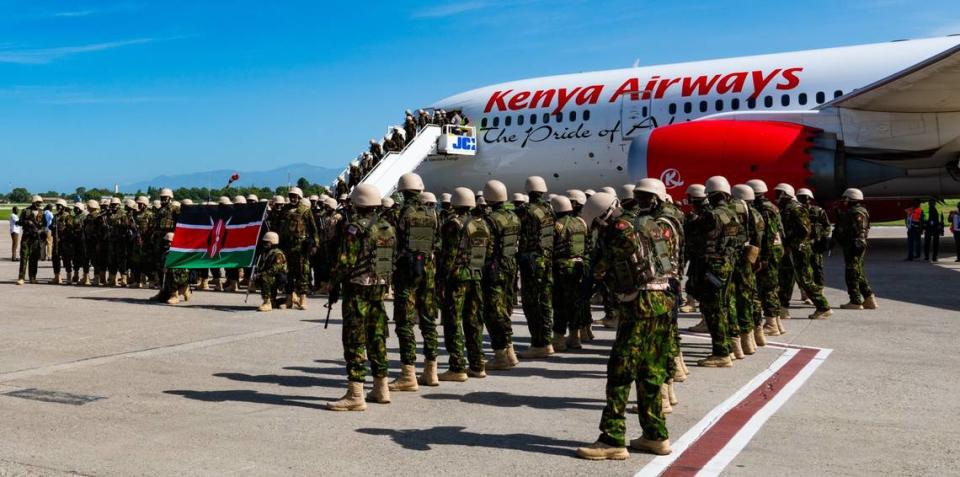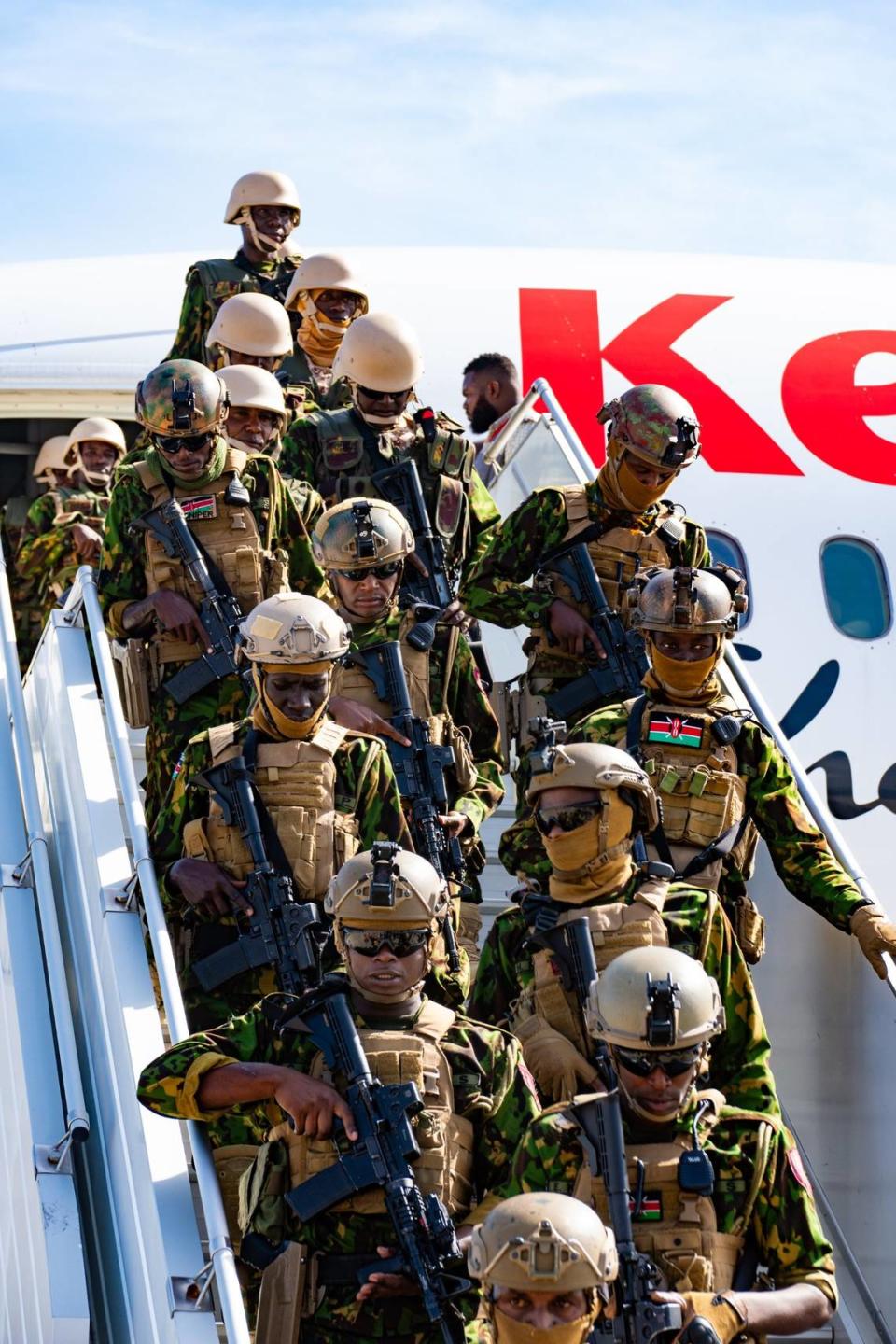Haiti has fired a warning to gangs. But is Kenya-led mission enough to stabilize the nation?
- Oops!Something went wrong.Please try again later.
A day after a planeload of 200 Kenyans arrived in Haiti to help rescue the Caribbean nation from the tightening grip of heavily armed criminal gangs, Garry Conille, the newly installed prime minister, stood under a searing sun at their command center and issued a warning to those wreaking havoc and fueling chaos.
“We will reclaim control of the country, house by house, neighborhood by neighborhood, city by city,” Conille said Wednesday as his new police chief, Rameau Normil, stood to the side along with the head of the Kenya-led armed security force.
Conille’s statement raised already high expectations that the foreign forces, working with Haitian police, will dismantle Haitian gangs. It also seemed to set the stage for a confrontation between the criminal gangs now controlling more than 80% of Port-au-Prince, and the long-awaited United Nations-backed mission.
But just hours after his warning, members of the 400 Mawozo gang set fire to an already abandoned town hall in the town of Croix-des-Bouquets, a sprawling suburb east of the Kenyans’ base on the grounds of the Port-au-Prince international airport.
The clashing optics show not just how high the stakes are in the fight to wrest control of Haiti back from its estimated 200 to 300 armed gangs, but how months into the insurrection that helped force the ouster of the previous government, no one knows how the mission will unfold.
As some of the specialized Kenyan officers took to the streets for the first time Friday, accompanying Haitian SWAT members on a patrol of the capital’s gang-decimated downtown, many questions remain. Are the reinforcements enough to turn the tide and stabilize a nation long in turmoil?
“It’s a very heavy lift, there’s no question,” Keith Mines, vice president of the Latin America program at the U.S. Institute of Peace in Washington said of the task ahead. “Tentatively, I want to hope for the best but it’s a real razor’s edge that they are walking on.”

For now, there are 200 Kenyans in country with another wave expected in less than two weeks. No timeline has been given for the deployment of other contingents from the Caribbean and other African nations, which have also volunteered.
Kenya has estimated that the mission, which was approved by the U.N. Security Council in October for a year, will cost $600 million. But a trust fund, administered by the U.N., has only amassed $21 million. So far, the Biden administration is the largest financial contributor, providing over $300 million for armored vehicles, training reimbursement and construction of the base, which Conille visited amid an eerie and precarious calm over the capital after months of daily automatic gunfire and threats by gang leaders to block the deployment.
Funding isn’t the mission’s only problem. Though the forces are slated to grow to 2,500, the current base can only accommodate up to about 450 people, according to those in the know, which raises questions about how many foreign troops will actually be on the ground at one time. The capacity constraints, the limited resources and the number of foreign troops now being allowed to participate because of the lack of money, make for a very challenging situation, said Mines. Still, there is some positive momentum, he said, citing Conille’s ongoing public outreach efforts.
“It’s just a question of whether it’s all going to add up and be enough, and if they can avoid a catastrophe, ‘a Black hawk down’ incident against the Kenyans that leaves them reeling or the opposite where they go in and shoot up some civilians,” Mines said.
Restoring security
Those involved in the planning of the Multinational Security Support mission have provided few details on how the foreign troops, working with Haitian police, are supposed to achieve their main objective: getting authorities to finally be able to hold long-overdue elections so that a new president and parliament can take office by February 2026.
Even the mission’s rules of engagement, required by the U.N. Security Council, have yet to be made public. But that’s not the only plan Haitians say they have yet to see.
“Kenya has arrived, a new police chief has been installed,” human rights activist Marie Yolène Gilles said referring to the transitional government’s decision to fire the previous police chief and name a new one just days before the deployment. “But we haven’t yet sensed anything has changed.”

Like many Haitians, feeling trapped by gangs’ control of roads and entire neighborhoods in the capital and neighboring rice-growing Artibonite region, Gilles has heard Conille’s recent declarations, including his call for armed groups to lay down their weapons.
“When you ask bandits to lay down their guns, it is too simplistic,” said Gilles, who runs the Fondasyon Je Klere/Eyes Wide Open Foundation. “A bandit always remains a bandit because when the bandits attack the population, they do so with rigor; they burn, they rape, they kidnap, they kill, they torch.”
“The gangs,” she added, citing the Croix-des-Bouquets attack, “are still active. There are still areas that are off limits and to quote the former minister of justice, ‘remain lost territories.’ ”
Foreign interventions
This is Haiti’s fourth major foreign military intervention in a little over a century. The first, in 1915, led to a near two-decade occupation by the United States after Haitian President Jean Vilbrun Guillaume Sam was overthrown and hacked to death by an angry mob.
The last two interventions before the arrivals of the Kenyans were both traditional U.N. peacekeeping missions, and didn’t produce the results many had hoped. The missions occurred within 10 years after separate coups —one by the military in 1994 and the other by armed rebels in 2004— ousted President Jean-Bertrand Aristide as he served out two separate presidential terms. The last was marred by a deadly cholera outbreak and the U.N.’s refusal to acknowledge its role and allegations of sexual misconduct by soldiers.

This time around, the catalyst, like at the turn of the century, was a presidential assassination.
The brazen slaying of President Jovene Moïse three years ago next month on July 7, allegedly at the hands of Colombian mercenaries, local police and politically ambitious Haitians and Haitian Americans, left the country in total disarray. Already mushrooming under Moïse’s unpopular rule and Haiti’s weak governance, criminal armed groups stepped into the power vacuum and grew in strength and firepower.
Now, seven years after the last U.N. blue-helmet troops left after a 13-year presence, Haiti once more finds itself reeling and forced to invite foreign boots on its soil. It’s a reality that has many Haitians torn, yet at the same time, wondering if this time, the results will be different.
READ MORE: From rebellious beginnings, Haiti has been beset by violence
Monica Juma, Kenya’s National Security Adviser, who accompanied the police officers to Port-au-Prince, has said she hopes that the security mission doesn’t become a permanent one. Conille, who left Haiti on Friday for meetings in Washington and New York this week, wants it to be Haiti’s last.
In order for both to happen, Haiti will need to find a way out of its endless cycle of instability, Haitians say, and put in place a plan that goes beyond just arresting and even killing gang members.
“When you look at what’s happening, it’s not just because people want” to create chaos, said Emmanuel Paul, a Port-au-Prince-based security expert. “It’s the result of years of bad decisions, bad politics.”
“Yes, we need an international force; yes we need weapons for the police and we need to reinforce the police so that it can combat the bandits. At the same time we have to reflect on the causes that brought us here,” he said. “If you have someone who is hemorrhaging, instead of you keep looking for blood to give him, it’s better to investigate why he is bleeding in order to block the hemorrhage.”
Haitian authorities, under then-Prime Minister Ariel Henry, first appealed for international assistance with their gang problem in October 2022. Since then, armed groups have forced more than 100,000 Haitians from their homes, bringing the displaced population to nearly 580,000 in three years, and driven millions to hunger. Today, over a million Haitians are facing starvation, according to the U.N.
“This violence has a name,” said Paul. “It’s the name of all the gang chiefs that we all know. But even if they were to arrest them, even if they were to eliminate them, we still need to look at what produced them. How did they get here? If we don’t do this, we risk taking decisions that could give us a little relief in the short term, but then we will return to the same problem. Every time we don’t resolve the problem, the situation gets worse.”
‘When you tally up their destruction, it is heavy’
So far, Conille, who has been touring the capital including some of the areas destroyed by the gangs, has not offered up any concrete plan on Haiti’s strategy to reclaim the country. Nor have the members of the nine-member transitional presidential council, put in place after Henry’s forced resignation. They were not at the airport to welcome the mission and have been silent, not even publicizing their meeting last Tuesday with the Kenyans and diplomatic corps. Other than writing to Kenya President William Ruto asking for the deployment, the presidential council has not been clear on what its expectations for the security mission are.
Their lack of clarity aside, some like Gilles are clear about what needs to happen.
“If we think it’s foreigners who are going to come and dig us from under what we are under, clean the streets, unblock the roads, we are lying to ourselves,” she said. “We have to take our destiny in hand so that what happened here in 2024 doesn’t happen again.”
Gilles has been compiling a list of government infrastructures that have been ravaged by gangs in the past year. They include over a dozen police stations that have been ransacked and bulldozed since Feb. 29 when armed groups united. Also on her list, dozens of hospitals, schools and the capital’s three largest prisons, now unusable. Two were raided on March 2 and March 3, leading to the escape of more than 4,000 inmates, many of them murderers and rapists. A third, a woman’s prison built on the northern edge by the U.S., was also taken over by gangs who have since plowed a tractor through it.
Even with the lack of prisons to jailed arrested gang members, Gilles said there needs to be a judicial process.
“Arresting bandits is one thing,” she said. “But the bandits need to go before the justice system and give testimony, because the population deserves to know. We need to know why did they destroy all of these police stations, raped all of these women, shut down all of these schools.”
“When you tally up their destruction, it is heavy,” she said.


